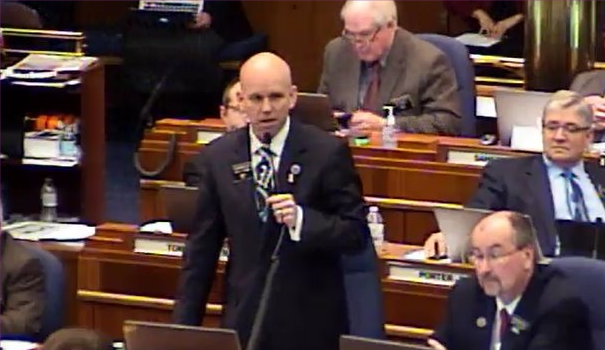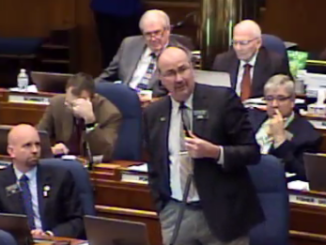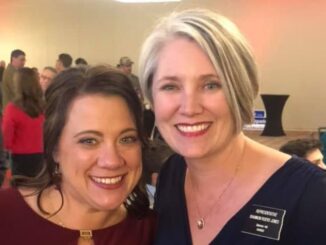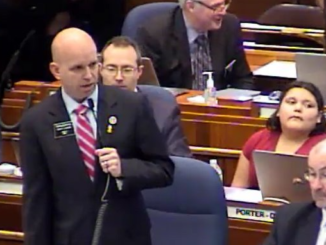
You might recall that back in December news broke that the NDGOP was considering a rule change that called for changes to state law in how political parties nominate their candidates for general elections. As the Bismarck Tribune explained, it would have given:
“… parties more flexibility on how they nominate their candidates for the general election ballot, allowing them to use a caucus or convention of its members rather than a primary election open to all of the state’s voters.”
In a nutshell, had the idea become a reality, it would have allowed political parties to determine for themselves, at the district and state levels, how their nominating processes would work. I wrote about my support for the idea, based on the fact that political parties are private organizations and should have the right to do so. It was an extremely divisive issue. As such, it was no surprise that in the end the proposed rule change was soundly defeated by a vote of the NDGOP’s State Executive Committee.
Though it failed, many speculated that the idea would end up in the form of legislation anyhow. So far as I’m aware, it never did. Which wasn’t a surprise to me. I wrote at the time the rule change was defeated that it was unlikely it would be.
But there were two pieces of legislation this week relating to ballots, endorsements, and party affiliation for local candidates that the North Dakota House dealt with. For reasons that I’ll explain in a moment, I think the House got them both right.
House Bill 1526 — this bill is sponsored by Andrew Marschall (R – District 16) and proposes to identify under a candidate’s name on a primary ballot whether they’ve been endorsed by the party or if their name appears by virtue of petitioning. HB 1526 passed on a vote of 65-25.
According to Rep. Vicky Steiner (R – District 37) — who carried the bill — the Secretary of State’s office provided her with information showing that over the course of the last 10 years there have been 36 challenges by petition on the Republican side and 3 for Democrats in races involving State House, State Senate, U.S. House, U.S. Senate, and Governor/Lt. Governor.
Because North Dakota law determines a political party’s nominee for office through the June Primary, it’s entirely possible for a candidate to fail in obtaining the party’s endorsement, but still become the nominee by winning the primary. This is exactly what happened in the 2016 Governor’s race, when Doug Burgum defeated the NDGOP endorsed candidate, Wayne Stenehjem, for the party’s nomination. In fact, this is how our current United States Senator Kevin Cramer became a United States Congressman back in 2012, when he defeated the NDGOP endorsed candidate, Brian Kalk.
According to Rep. Steiner, the Government & Veterans Affairs committee, who heard HB 1526, felt that it’s really a toss-up of whether listing endorsed or by petition under the candidate’s name helps or hurts them. It’s all in the mindset of the voters. For the most part though, endorsed candidates typically find their way to victory. It takes a fair amount of campaign resources for an unendorsed candidate to have a chance of claiming victory over an opponent who has the party’s backing.
Much like the NDGOP rule change that failed in December, I believe that if we’re going to list political parties on a ballot, they should have the right to determine who’s listed as their endorsed candidate. For that reason, I think the North Dakota House got it right by passing the bill.
House Bill 1375 — this bill was sponsored by Rep. Scott Louser (R – District 5) and proposed listing party affiliation or “independent” for candidates on ballots for local elections. Instead of “independent” it was amended in committee to allow the option of “No Party”. HB 1375 was defeated on a vote of 37-53.
Louser argued in favor of his bill on the basis of transparency. In an ideal situation, I suppose that may be true. But in the real world of politics, it just doesn’t hold water. The very “super-majority” that Rep. Louser is a part of is the perfect illustration. Does this super-majority of Republicans in the North Dakota House truly reflect what the NDGOP claims to stand for? If we stack their voting records against the party’s resolutions, do they largely match? Not even close. So, does a candidates claiming a party affiliation necessarily mean anything? I don’t believe so.
We have RINO’s at the state level. Are we to think that would somehow not be the case at the local level? Aside from this, in many local communities, it’s well-known which party a candidate affiliates with. So, that too makes the legislation somewhat pointless.
In addition to this, under HB 1375, a candidate could have claimed affiliation with their party of choice or “no party” at all. So, when it comes down to it, the bill really made no sense.
What I’d like to see is no party affiliation listed on a ballot at all— for any office. It seems we’ve reached a point where far too many voters go to the polls uninformed. They look at letters next to names — and vote based off that — instead of doing their homework to find out what the candidate actually stands for.
What we need is a more informed electorate. And I don’t think listing supposed party affiliation contributes to that. In fact, I think it makes things worse.
PLEASE LIKE & SHARE!
Sources:
- https://bismarcktribune.com/news/state-and-regional/nd-gop-eyes-law-change-allowing-parties-to-avoid-bitter/article_6f62734c-d1a2-5ef3-9ac1-5aad9ab44075.html
- https://theminutemanblog.com/2018/12/10/why-i-support-the-ndgop-resolution-to-potentially-eliminate-primaries/
- https://theminutemanblog.com/2018/12/13/breaking-ndgop-state-committee-shoots-down-rule-change-on-primaries1/
- https://www.legis.nd.gov/assembly/66-2019/bill-index/bi1526.html
- https://ballotpedia.org/Doug_Burgum
- https://ballotpedia.org/Kevin_Cramer
- https://www.legis.nd.gov/assembly/66-2019/bill-index/bi1375.html





